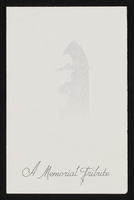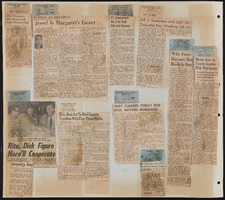Search the Special Collections and Archives Portal
Search Results

Mabel Hoggard: family materials
Date
Archival Collection
Description
Folder of materials from the Mabel Hoggard Papers (MS-00565) -- Personal papers file. This folder contains obituaries, newspaper clippings, cards, and programs.
Mixed Content

Transcript of interview with Jackie Abell by Robert Stuart, April 03, 1976
Date
Archival Collection
Description
Text

Sook-ja Kim, February 12, 1996 and April 6, 1996: transcript
Date
Archival Collection
Description
The Kim Sisters, composed of three sisters, Sook-ja, Ai-ja, and Mia, came from Korea to Las Vegas in February 1959. Their first contract in America was to perform at the Thunderbird Hotel for four weeks as part of the China Doll Revue, the main showroom program. This engagement led to a successful career. Their popularity reached was at its height at the end of the 1960s when they performed throughout the United States and Europe. Sook-ja Kim is the oldest of the sisters. After his sister Ai-ja died in 1987, Sook-ja teamed up with her two brothers and continued to perform until 1989. Now semi-retired from show business, with occasional performances in Korea, she is working as a real estate agent. In this interview, she talked about her childhood, her career, and the family she has built since coming to America. Sook-ja was born in 1941 in Seoul, Korea as the third child of seven in a musical family. Her father was a conductor and her mother, a popular singer. After the Korean War, her mother arranged to send the Kim Sisters to America. When they came to Las Vegas, there were virtually no Koreans in the area. They depended on each other to take care of themselves. Some of the difficulties they had to adjust to in American were language, food, and cultural differences. Over the span of almost forty years in America, Sook-ja became acculturated without discarding her ethnic identity of family priorities. Her life-long guiding principle has been to adopt certain American values while continuing to keep her cherished Korean ethnic values. Through their performances, the Kim Sister informed the audience about Koreans and their culture. As the oldest of the group, Sook-ja was entrusted the care of her sisters, and later her brothers, the Kim brothers. Once she settled in Las Vegas, she brought more than forty members of her extended family to the city, contributing to the growth of the Las Vegas Korean community.
Text

Transcript of interview with Edna Jackson-Ferguson, April 15, 1975
Date
Archival Collection
Description
On April 15, 1975, Edna Jackson-Ferguson (born 1897 in Overbrook, Kansas) provided a narrative-style oral history about her and her husband Jack’s experiences during the building of the Hoover Dam. Jackson-Ferguson provides many details about the way of life living in the camp with workers of the dam, the tasks required of those workers in building the dam, and some of the actual processes of pouring the concrete for the structure. She also talks about food, transportation, weather, and entertainment during the time. To conclude the interview, Jackson-Ferguson mentions some of the other job positions her husband held and their pride in being a part of the Hoover Dam’s construction.
Text

Robin Greenspun oral history interview: transcript
Date
Archival Collection
Description
Oral history interview with Robin Greenspun conducted by Barbara Tabach on February 09, 2017 for the Southern Nevada Jewish Heritage Project. In this interview, Greenspun discusses her family background and growing up in Las Vegas, Nevada. She talks about her early interest in the arts, working in television productions, and becoming a film director.
Text

Meeting minutes for Consolidated Student Senate, University of Nevada, Las Vegas, February 21, 1978
Date
Archival Collection
Description
Text

Gregory Koehler oral history interview: transcript
Date
Archival Collection
Description
Oral history interview with Gregory Koehler conducted by Claytee D. White on May 15, 2019 for the Remembering 1 October Oral History Project. Koehler begins talking about his family, early life, and occupation. He explains the line of jobs he has had, his history with firefighting, and how he moved to Las Vegas, Nevada in 2003. Koehler then recalls how he had attended the Route 91 Festival concert and the events that unfolded during the shooting. He describes what he saw, felt, and how he tried to help the people who were shot. Lastly, he talks about the aftermath of the event and the struggles he had gone through.
Text


